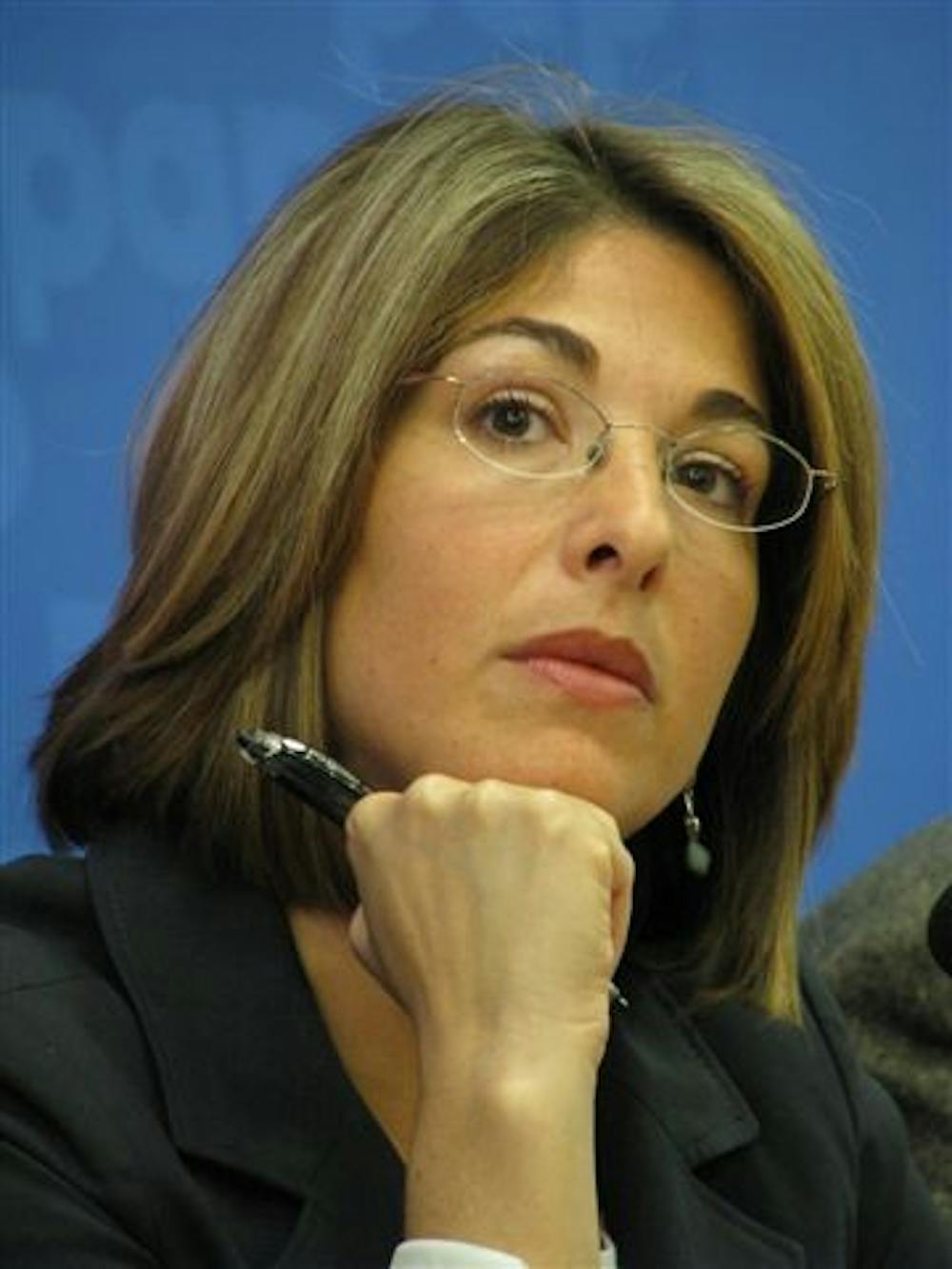When Naomi Klein looks at the world today, she sees flames. There are three “fires” that the global community is facing, she told an audience at Richardson Auditorium on Tuesday, and they are increasingly converging.
Klein gave introductory remarks before speaking with Assistant Professor of African American Studies Keeanga-Yamahtta Taylor about Klein’s new book, “On Fire: The (Burning) Case for a Green New Deal.” She is a Canadian journalist and activist widely known for her biting indictments of capitalism and globalization.
The first “fire” that Klein identified is the central concern of her book: climate change.
She cited the Intergovernmental Panel on Climate Change’s 2018 report, which laid out both a plan and a deadline for global leaders to stave off climate chaos. The plan, Klein said, was an “‘unprecedented transformation in virtually every aspect of society,’ in energy, in agriculture, in transportation, in building construction.” The deadline was twelve years, now down to eleven — what Klein described as a “very, very, very short window.”
“Any of us who focus even tangentially on what we’re hearing from climate scientists knows that what we do or don’t do in the next handful of years will determine the lives and fates of hundreds of millions of people,” Klein said.
The second “fire,” Klein said, is a political one.
She pointed to the ascendancy of populist leaders in the U.S., Brazil, the Philippines, India, Australia, and Russia. In each of these countries, Klein said, politicians are defining national in-groups against a “sharply defined out-group, inside the respective countries and outside, on the borders … the illegal, the illegitimate, the frightening other.”
And these two fires — the “political and the planetary” — are linked, Klein added.
“I think they are feeding each other,” she told the audience. “I don’t think it’s a coincidence that at the very moment when the reality of climate breakdown ceases to be some future, abstract threat off in the indeterminate distance and becomes a lived reality, that at this very moment we have the global phenomenon of the rise of these strongmen figures, riling up hatred, turning populations against each other, using this fear and sense of scarcity.”
Politicians like President Donald Trump and President of Brazil Jair Bolsonaro are facilitating rather than fighting climate change, Klein said, from relaxed environmental regulation in the United States to wildfires rippling across the Amazon. Meanwhile, climate events are having the most devastating impact in other countries, those without the infrastructure and resources to adequately deal with them.
Klein argued that this imbalance has “created the cruel irony that the very people who are forced to move first are the people who did the least to create this crisis.”
“They deserve not just asylum but an apology,” she added.

Rather than asylum and apologies, however, Klein claimed that powerful countries are responding to climate change with a model of economic development that profits off of climate refugees. She traced the origin of this model from the “Island Solution” in Australia to criminalization of migrants in the E.U. to the treatment of immigrants at the U.S. border.
The result, Klein asserted, is “climate barbarism,” a me-first response to climate change that entails cutting down on foreign aid and funneling money into the containment of climate refugees.
But there is an important alternative, she argued, to the policies of climate barbarism, and it lies in the “third fire”: the global climate justice movement.
This fire is being stoked by Greta Thunberg and the Sunrise Movement, and it is proliferating, Klein stated, gaining followers in an exponential and unprecedented fashion. In September, over seven million people took to the streets in worldwide climate strikes.
“There is incredible urgency in the fires that have been lit in this coming generation, and they’re trying to light fires in the generation that came before them,” Klein said.
Klein also emphasized that the global climate movement needs to be intersectional in order to match the demands of “intersecting crises” in political, economic, and social realms. In this sense, the radical scope of these crises presents an opportunity for a radical re-envisioning of society’s most basic yet problematic structures — a central argument in her book.
“It’s going to take an all-out war on pollution and poverty and racism and colonialism and despair, all at the same time,” Klein read from the introduction to her book.
In conversation with Klein, Assistant Professor Taylor asked what factors have contributed to the sudden, rapid visibility of the climate movement, particularly in the United States. Klein said that the lived experience of climate change — hotter, longer summers; wildfires in California — are helping to bring urgency to the movement, along with publicized scientific reports and collective action.
Klein and Taylor also discussed the role that climate policies are playing in the 2020 election. Klein critiqued Senator Elizabeth Warren’s recent interpretation of climate change as an issue of political corruption, emphasizing instead that it is inextricably linked to capitalism. She also said that Senator Bernie Sanders’ “Green New Deal” proposal is the most internationally focused.
But across the slate of Democratic candidates, the unprecedented attention given to climate policy indicates an “absolute sea change” in the way we are approaching the climate crisis, Klein emphasized.
“Just a few months ago we were talking about whether we can get Republicans on board for a revenue neutral carbon tax,” she said. “This really is a shift.”
The lecture, entitled “A Call to Action: The (Burning) Case for a Green New Deal” was held at 7 p.m. in Richardson Auditorium. It was organized by the Humanities Council’s Gauss Seminars in Criticism in partnership with Labyrinth Books and co-sponsored by the Princeton Environmental Institute (PEI), the Department of English, the Program in Latin American Studies and New Jersey Policy Perspectives.









